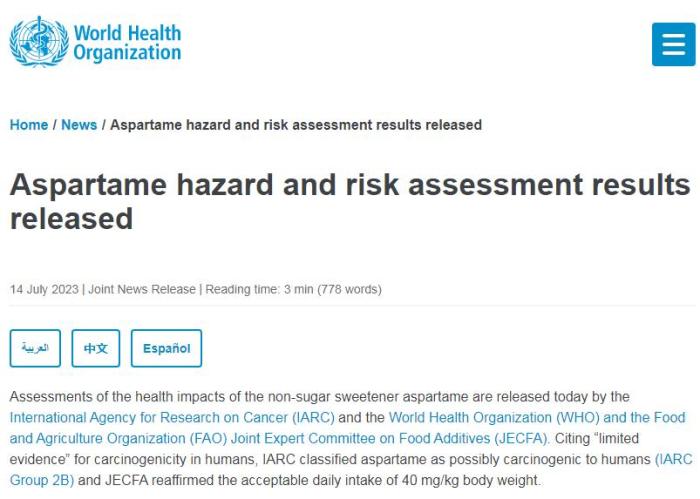BEIJING, July 14 (Xinhua)-The World Health Organization (WHO) released relevant assessment results on the 14th local time in official website, and listed aspartame as a possible carcinogen, but added that it is safe to ingest aspartame if the daily intake does not exceed 40 mg per kilogram of body weight.

Image source: WHO official website screenshot
Francesco Blanca, Director of Nutrition and Food of WHO, introduced two evaluation results of aspartame research at a news conference, and said, "We are not suggesting that companies withdraw their products, nor are we suggesting that consumers stop using them completely. Just recommend moderate intake. "
Recently, the controversy about "aspartame causing cancer" has aroused widespread concern. On 14th, WHO released a message in official website, and the Joint Expert Committee on Food Additives (JECFA) of the International Agency for Research on Cancer (IARC), the World Health Organization and the Food and Agriculture Organization of the United Nations (FAO) released the assessment results of aspartame’s health impact.
According to WHO, aspartame is an artificial sweetener, which has been widely used in various foods and beverages since 1980s, including diet drinks, chewing gum, ice cream, dairy products (such as yogurt and breakfast cereal), toothpaste and medicines (such as cough drops).
IARC cited "limited evidence" of human carcinogenicity, and classified aspartame as a possible carcinogen (IARC 2B group), while JECFA reiterated that the acceptable daily intake was 40mg/kg body weight.
JECFA said that a person’s daily intake is safe within this limit. For example, if a person does not eat from other food sources, then an adult weighing 70 kilograms needs to consume more than 9-14 cans of sugar-free drinks containing 200 or 300 milligrams of aspartame every day to exceed the acceptable daily intake.
"Cancer is one of the leading causes of death in the world, and one in six people dies of cancer every year." Blanca said that the evaluation of aspartame shows that although the safety is not the main problem of commonly used doses, its potential impact has been described and needs to be investigated through more and better studies.
According to the news, IARC and JECFA conducted independent but complementary reviews to assess the potential carcinogenic hazards and other health risks related to the use of aspartame.